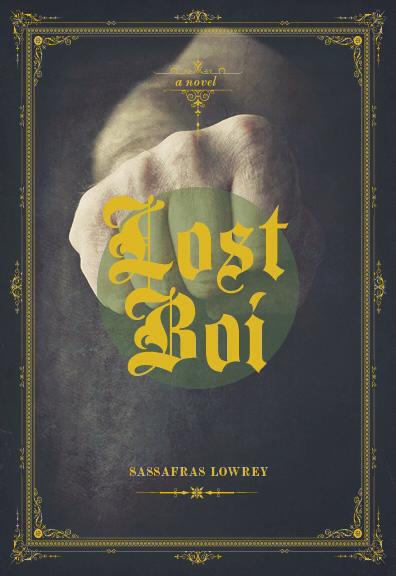 I don’t even know where to start in describing how much I loved this. I am tempted to just tell you “This is a queer punk retelling of Peter Pan.” If that intrigues you (as it did me), don’t hesitate. It will be all you dreamed of and more. And if that doesn’t interest you–if a D/s leather queer homeless youth interpretation of Peter Pan complete with sex worker mermaids, pigeon fairies, and Leather pirates doesn’t sell you on it–then it probably won’t be your cup of tea. But because I have a lot of feelings about this book, I’ll elaborate anyways.
I don’t even know where to start in describing how much I loved this. I am tempted to just tell you “This is a queer punk retelling of Peter Pan.” If that intrigues you (as it did me), don’t hesitate. It will be all you dreamed of and more. And if that doesn’t interest you–if a D/s leather queer homeless youth interpretation of Peter Pan complete with sex worker mermaids, pigeon fairies, and Leather pirates doesn’t sell you on it–then it probably won’t be your cup of tea. But because I have a lot of feelings about this book, I’ll elaborate anyways.
Just from first impression, Lost Boi is a beautiful book. With the black cover, gold framing, and deckle edges, it looks reminiscent of a bible. I also was immediately struck by the perspective of the novel: it’s told by one of the lost bois, Tootles. The whole time I was reading, I was considering whose story this is. Is it Wendi’s? Pan’s? Tootles? I think you could argue for any of those convincingly, but having it from a lost boi’s perspective gives a lot more weight and consideration to their circumstances, to their real experience of living out Pan’s vision of Neverland.
Sadly, I haven’t read the original Peter Pan (but now I want to just to re-read Lost Boi and get even more out of it). But even without an intimate understanding of the original text, it’s obvious how much has been incorporated into this interpretation. Every adaption feels completely natural, even one-off lines like “second streetlight on the right and straight on till Morning street!” work equally well as references and as in their own context.
What made fall in love with Lost Boi was how much it caught me off balance. I loved the variety of pronouns and identities, and how Lowrey doesn’t explain everyone’s gender identity to the reader. It’s incredibly queer, and though I would like to think that I don’t assume people’s gender identities or expressions, I would find myself surprised when descriptions of bodies or clothes didn’t match up with what I imagined. “Huh, so that character wears a sports bra!” “Oh, so one of the bois uses she/her pronouns.”
Beyond the gender and sexuality aspect, there’s also the whole question of the D/s dynamic between Pan and the bois. Pan is significantly older than the other bois, maybe close to twice some of their ages, and consent and safety are not top of his priority list. At times I was uncomfortable with Pan and wondering whether he was a positive character–and then I realized that this is an interpretation of Peter Pan! He’s not supposed to be a perfect person, or even someone you always like. That’s part of the refusal to grow up: his refusal to consider the consequences, or to necessarily take responsibility. Pan/Peter Pan have magic to them, and wonder, and definitely an attraction, but they’re also dangerous and reckless. He’s supposed to be a character that the reader has a complicated relationship, I think, and that makes perfect sense considering the complicated relationships he has with everyone else.
It also made me think about the association of queer identity with youth–how little representation there is for being a queer grown up. And the further you are along the scale of GLBT+, the fewer representations you’ll have of being an adult, or god forbid being elderly. That makes it difficult to know how to be queer and an adult at the same, suggesting that you have to choose one. And of the course the term “boi” itself, a gender identity, is dependent on that association with youth. I loved Sassafras Lowrey’s look at the difficulties of this, and hir acknowledgement that there are things you lose growing up, magic you lose. But ze still offers a glimpse of alternative kinds of adulthood, that you don’t have to lose your identity to become an adult.
The first book I read by Sassafras Lowrey was the collection ze edited about and by queer homeless youth, Kicked Out. That is also an excellent book, but it’s interesting to read Lost Boi with that in mind, because although the Pan and the lost bois’ story is told through the interpretation of Peter Pan, it doesn’t use their homelessness as just a prop in the story, an interesting setting for Neverland. Lowrey cared about the kids who have to live this, and that really shines through when we get glimpses of the lost bois’ lives before Neverland and why exactly they “fell out of the pram”.
This was one of my favourite books I read this year, only the second 5 star rating I’ve given since January (The Color Purple was the first). I highly, highly recommend this one, though do be warned that this has a lot of D/s and the “battles”/scenes can be pretty brutal. In conclusion: “Queer punk Peter Pan reimagining.” Go read it.

Pingback: Master List of Lesbrary Recommendations – The Lesbrary
Pingback: Updated Recommendations List – The Lesbrary